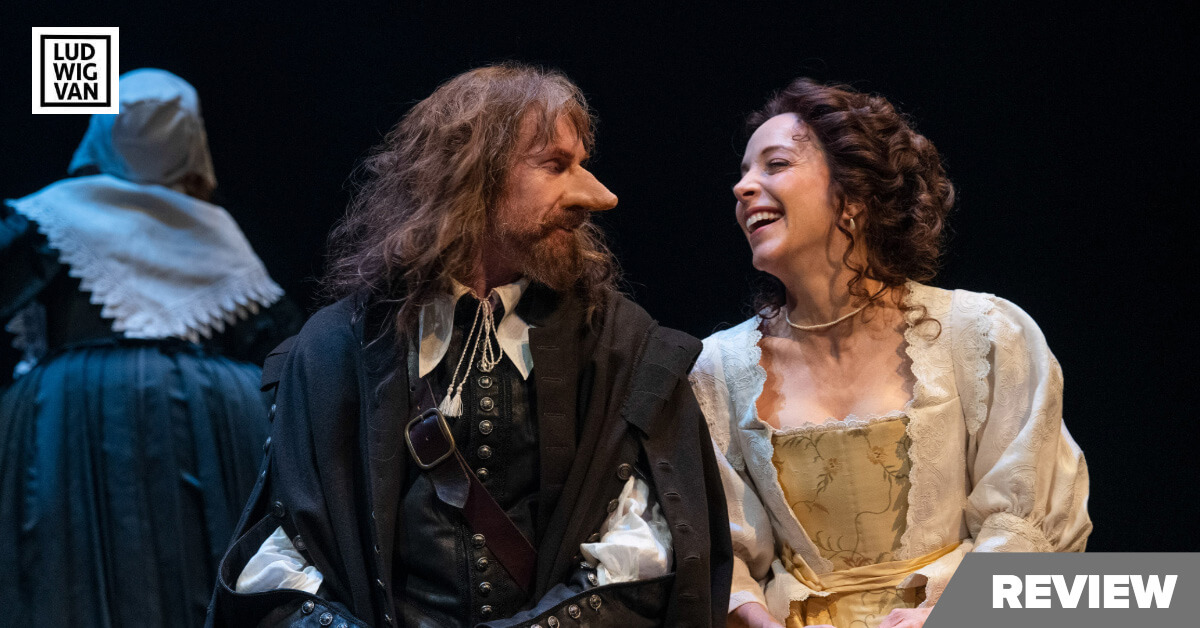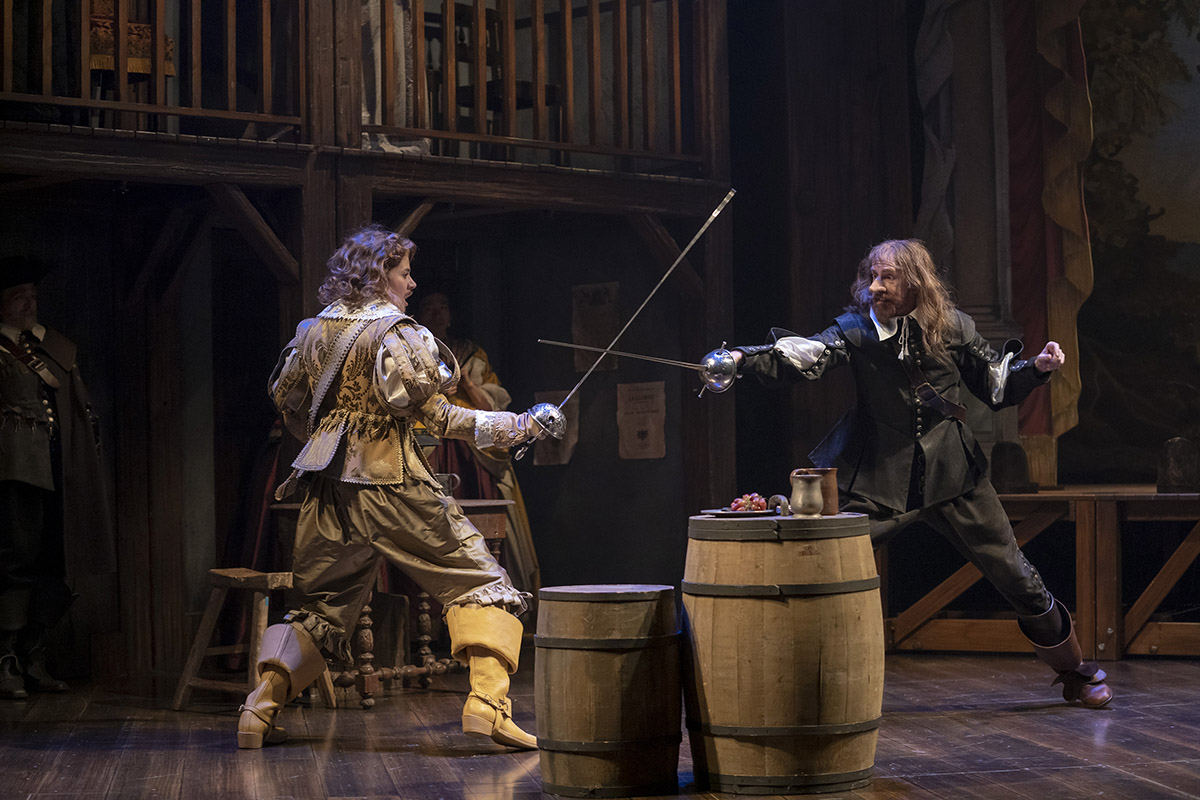
Shaw Festival 2019/ Cyrano de Bergerac by Edmond Rostand, translated and adapted by Kate Hennig, directed by Chris Abraham, Royal George Theatre, Jul. 27 to Oct. 20. Tickets available at shawfest.com.
Cyrano de Bergerac is one of the most popular French plays in the world having charmed legions of audiences in a multitude of languages. You could almost say that it is foolproof theatre with its endearing hero, romantic story of blighted love, and tragic/comic interplay. The Shaw Festival’s new adaptation of Cyrano is another jewel to add to the play’s diadem of much-loved productions.
French playwright Edmond Rostand took a big chance in 1897 when he wrote Cyrano in the old-fashioned style of a seventeenth-century verse drama in Alexandrine rhyming couplets. The very first time I saw Cyrano, I actually thought Rostand was the same vintage as Molière and Racine, when in fact, he was a contemporary of George Bernard Shaw. To emulate Rostand, almost all translations of Cyrano create a verse drama in whatever the language, but Kate Hennig, the Shawfest’s associate artistic director, has taken a fresh approach in her new adaptation. As she writes in her program notes, she opted for prose to get closer to Rostand’s original dialogue. As a result, we have an English adaptation that is a more faithful recreation of Rostand’s wit, satire, melodrama, and yes, poetry. Hennig’s version also gives new perspective on character and text.
For those who don’t know the story, here is a brief summary. Cyrano (Tom Rooney), an independently-minded, free-spirited soldier, poet, swordsman and philosopher, loves his cousin Madeleine Robin, who as a précieuse has taken the name of Roxane (Deborah Hay). Unfortunately, Cyrano’s swash-buckling panache covers-up a deep-seated inferiority caused by his huge ugly nose. Roxane, in turn, loves the cadet Christian de Neuvillette (Jeff Irving) who is jaw-droppingly handsome. She later moves beyond this superficial attraction, and comes to love Christian’s soul through the letters he writes to her. It is Cyrano, however, who has written the letters when Christian proved to have no ability to convey the language of courtly love, so prized by précieuse Roxane. When Christian dies in battle, Roxane retires to a convent to mourn him. Only too late, does Roxane discover that Cyrano was the letter writer. “I have loved but one man in my life,” she says, “and I have lost him twice.” The cast is rounded out by various friends, villains, companions and hangers-on.
The wonderful Rooney (another switcheroo from Stratford) was born to play Cyrano. His ease and speed with language allows Cyrano’s wit to roll off his tongue, and it is this clever wordplay that is paramount to any portrayal. Rooney’s characterization also presents a complicated man, and the actor moves between Cyrano’s swagger and compassion, his cruelty and empathy, and his strength and vulnerability with equal measure. We also feel Cyrano’s lovesick heart. In Hennig’s adaptation, and Rooney’s take on the character, you pick up that Cyrano does not regard Christian as a friend. In fact, he is quite contemptuous of his fellow soldier. Rather, Christian is the tool that allows Cyrano to pour out his heart to Roxane in the letters. Rooney, one of the best actors in the country, dominates the stage at every instance, and he truly gives a memorable performance.

Which brings us to the one serious weakness of this production, and that is the casting of Deborah Hay as Roxane. In the past, Hay has given awesome performances, be it Billie Dawn in the Shaw’s Born Yesterday, or Beatrice in Stratford’s Much Ado About Nothing. Unfortunately, her little girl voice-cum-ingénue just doesn’t work, although she fares better as the older widow. Her Roxane is, in a word, insipid, and it is difficult to believe that a dynamic wordsmith like Cyrano would love a Roxane who is blancmange. Roxane needs to convey cleverness, and vitality, and wit, and sparkle, and Hay’s underplaying leaves a big hole on the stage.
Irving certainly looks good as Christian, and this adaptation gives him the intelligence he is due. Christian is not stupid, just inarticulate in the matter of word games, in short, a proud, plain-spoken man. We see his innate nobility when he realizes that Roxane loves the letter writer, not him. In fact, Hennig’s adaptation presents more than stereotypes in most of the characters portrayed by gender-bending actors. Tanja Jacobs (Le Bret), who makes a terrific gruff old lady in Man and Superman, shows she can be a great gruff old man in Cyrano as the lead character’s best friend. Marla McLean (Lignière) is a delightful bratty satirist. Courtney Ch’ng Lancaster (Valvert) makes a very good pompous fop. Sharry Flett (Companion), who actually plays a woman, is amusing as Roxane’s befuddled duenna.
Of the men who are actually played by men, Patrick Galligan (De Guiche), the villain of the piece, turns out to have both courage and sympathy. Kyle Blair (Ragueneau) portrays the poetry-obsessed baker in charming fashion. David Adams (Montfleury) is the perfect blowhard actor whom Cyrano drives off the stage. Good support also comes from Jason Cadieux, Emily Lukasik, Michael Man and Kiera Sangster. Hennig reduced Rostand’s mammoth cast to seven women and seven men, and the strong Shaw ensemble is excellent as it takes on multiple roles. Director Chris Abraham has populated his stage with an excellent thumbnail portrait of seventeenth-century Paris, in a production filled with vitality and verve.
The big surprise is that Cyrano is being performed in the small Royal George Theatre, but it works, thanks in part, to Julie Fox’s clever set of two-tiered wooden flats that are transformed through various venues with well-choreographed set changes orchestrated by the cast. In fact, the intimacy of the playing space makes for a more immediate bond between players and audience. Fox’s period costumes are gorgeous, and how Abraham manages to position so many seventeenth-century big clothes on a small stage is a marvel. Kimberly Purtell’s lighting is inspired, conveying the misty light of the past with no reference to glaring modern sensibility. Thomas Ryder Payne’s clever sound design contains both period music covering the scene changes, and ambient noise that ranges from crickets for the garden to cannons for the battle scene.
In short, the action of the play does not let up for a moment, and Abraham’s production of Cyrano literally sweeps you up in its warm embrace. Once again, Edmond Rostand, via Kate Hennig, strikes gold with his timeless play about the beloved character with the big nose.
[Update – August 30, 2019: A previous version misspelt the names of Emily Lukasik, Michael Man.]
LUDWIG VAN TORONTO
Want more updates on classical music and opera news and reviews? Follow us on Facebook, Instagram or Twitter for all the latest.
- INTERVIEW | Actor Diego Matamoros Takes On Icon Walt Disney In Soulpepper Production Of Hnath Play - April 16, 2024
- SCRUTINY | Opera In Concert Shine A Light On Verdi’s Seldom Heard La Battaglia Di Legnano - April 9, 2024
- SCRUTINY | Lepage & Côté’s Hamlet Dazzles With Dance And Stagecraft Without Saying Anything New - April 5, 2024



